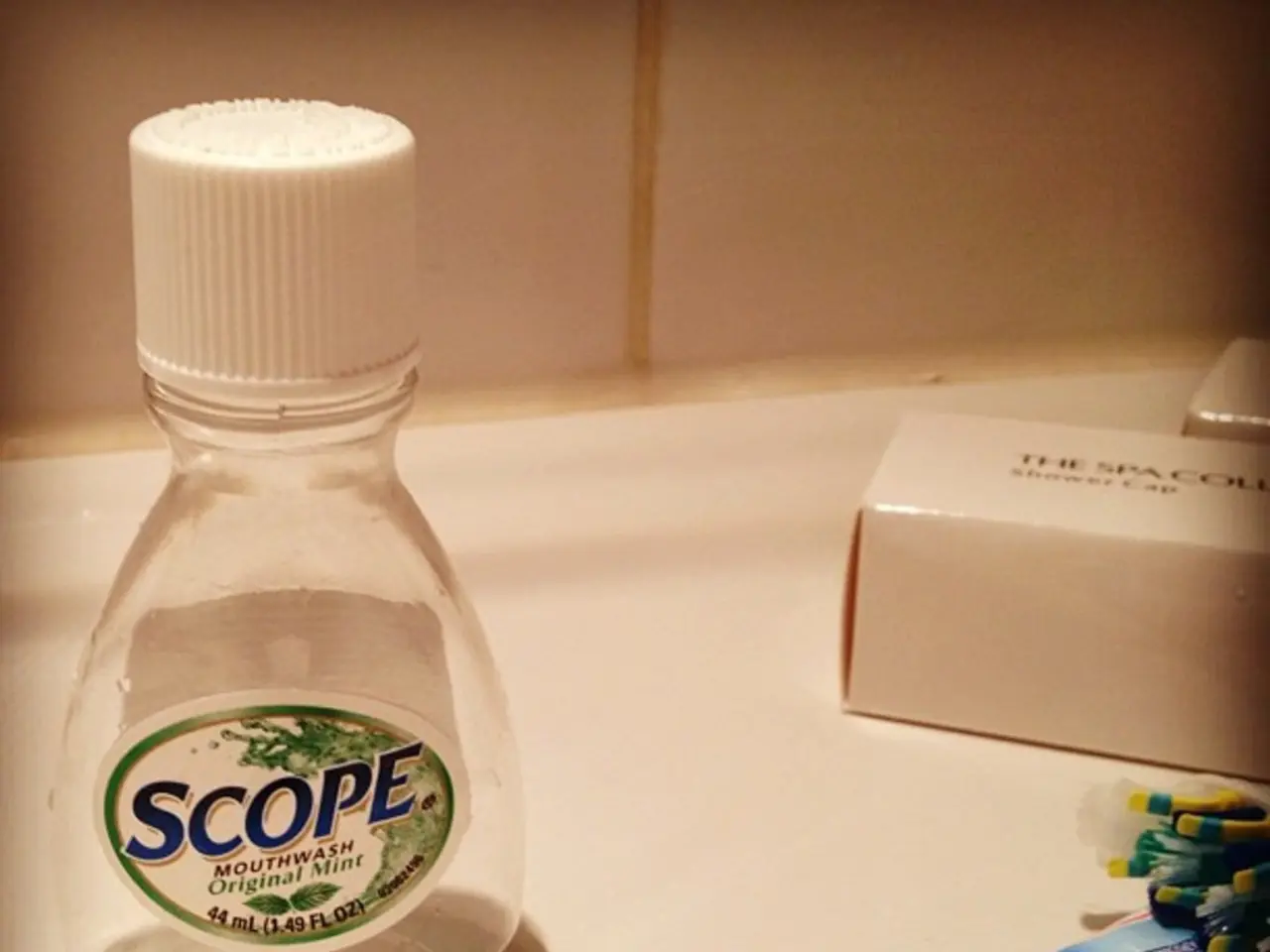Nasal Rinse with Baking Soda: Exploring its Advantages and Preparation Methods
In the quest for relief from nasal congestion and allergies, many turn to over-the-counter remedies. One such natural solution gaining popularity is the use of baking soda in saline nasal rinses.
By mixing 1 teaspoon of baking soda with 1 cup of distilled water, you can prepare a gentle saline solution that offers numerous benefits. This mixture, when used correctly, can help clear mucus, reduce symptoms related to allergic rhinitis, chronic sinusitis, flu, cold, runny nose, postnasal drip, and allergies to pollen or dust.
Baking soda, or sodium bicarbonate, aids in balancing the pH and soothing nasal tissues when combined with salt in a saline rinse. It helps loosen and clear thick mucus, flush out allergens and irritants, and reduce nasal congestion and inflammation.
When preparing a saline solution with baking soda, it's crucial to ensure the solution has cooled down before use to avoid burning the tissues in the airways. Common ratios for the mixture include 3 teaspoons of non-iodized salt and 1 teaspoon of baking soda, mixed in sterile or distilled water for multiple uses, or smaller amounts per rinse.
This saline solution moisturizes dry nasal passages, loosens mucus, and helps wash away pollen, dust, pet dander, bacteria, and viruses that trigger or worsen symptoms. Many over-the-counter nasal sprays, including those branded Simply Saline, incorporate baking soda for its mucous-drying, non-drug properties, especially addressing severe congestion associated with allergies, colds, flu, and sinus infections.
However, it's essential to note that side effects can include brief stinging or burning, irritation, or itching, especially if the saline is hypertonic (saltier than normal body fluids). Adjusting salt concentration or inhalation pressure can help reduce discomfort.
Nasal rinses with baking soda have no direct medication action but improve the effectiveness of medicated nasal sprays by clearing mucus first, allowing better drug contact with nasal tissues. They are generally safe when used with sterile or distilled water; using untreated tap water risks infection.
In addition to nasal rinses, supportive nasal symptom relief includes steam inhalation, warm compresses, hydration, humidifiers, and allergen avoidance in the environment.
Recent studies have shown that nasal irrigation preparations containing baking soda can effectively clear SARS-CoV-2, the virus that causes COVID-19, in 55 people with mild to moderate symptoms.
For children, a half teaspoon of baking soda and 4 oz of water is recommended. However, it's important to note that using a nasal rinse before bed may cause coughing due to solution dripping into the throat.
Several over-the-counter nasal rinse preparations containing baking soda are available. People can also prepare a nasal wash at home. If a person frequently experiences a runny or stuffed nose, they should consult a doctor to determine the underlying cause and recommend appropriate treatment.
Nasal irrigation preparations containing baking soda can be particularly helpful for people with recurring nose congestion due to conditions like chronic sinus or rhinitis. A sodium bicarbonate nasal rinse can help treat and relieve symptoms of conditions such as flu, cold, runny nose, postnasal drip, pollen or dust allergies.
However, it's crucial to use the recommended amount of baking soda as stated in instructions or advised by a doctor. Using a baking soda nasal rinse can help clear mucus and particles, including viruses and bacteria.
While baking soda in nasal rinses is usually safe, there is a risk of developing bacterial meningitis from sinus rinses. More research is necessary to understand the association between the two. If a doctor recommends regular nasal washes with baking soda, ask for the best way to prepare and use them, and always report any discomfort or worsening of symptoms.
People with allergic rhinitis and acute or chronic sinusitis might consider using baking soda nasal rinses regularly. Safety tips for using baking soda nasal rinses include not using them if you have an open wound in or around the nose, and not using them if you have an active infection in the sinuses or nasal passages.
It's always essential to consult a healthcare professional before starting any new treatment, including the use of baking soda nasal rinses. Keep nasal solution out of reach of children.
- Science continues to explore the benefits of baking soda, specifically in the context of helping alleviate respiratory conditions such as chronic sinusitis and allergic rhinitis.
- In addition to the use of baking soda in nasal rinses, therapies and treatments for eye-health, hearing, fitness-and-exercise, skin-care, and nutrition play a significant role in maintaining overall health-and-wellness.
- Alongside workplace-wellness initiatives, the practice of nasal irrigation with baking soda, such as the home preparation or over-the-counter saline solutions, offers temporary relief from symptoms related to allergies, flu, and colds.
- For those navigating Medicare and seeking coverage for treatments like baking soda nasal rinses, it's essential to understand their benefits and discuss their use with healthcare providers.
- Due to its mucous-drying properties, baking soda nasal rinses can be beneficial for people suffering from chronic diseases like asthma, which often includes respiratory conditions.
- When dealing with skin-conditions, beyond quality skincare products and hydration, maintaining eye-health is crucial, especially for those with sensitive eyes or allergies.
- While allergies and upper respiratory infections can make it challenging to maintain a regular exercise routine, taking small steps towards fitness-and-exercise can help boost the immune system and overall well-being.
- In the context of medical-conditions, it's important to be aware of potential interactions between treatments—for instance, using a baking soda nasal rinse in combination with prescribed medicated nasal sprays.
- Alongside preventative measures such as handwashing, wearing masks, and social distancing, nasal rinses containing baking soda can be an effective tool in fighting infections like the flu, helping to prevent the respiratory spread of viruses like SARS-CoV-2.




